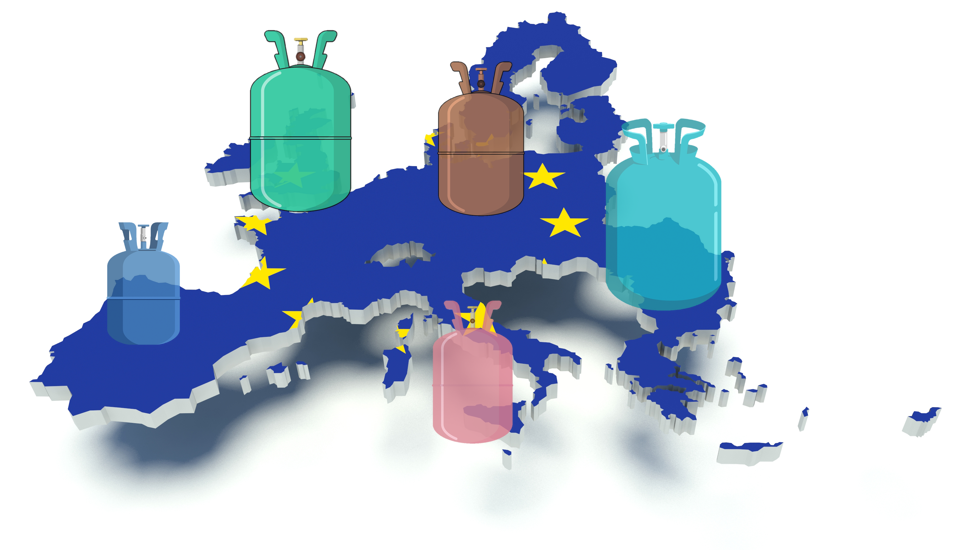Trialogue negotiation on F-Gas Regulation: final text before the summer?
In an article for La Rpf – Revue Pratique du Froid, the AFCE (Alliance Froid Climatisation Environnement) suggested that a final text may emerge from the trialogue discussions before the summer, perhaps by the end of June. While the negotiating position of the EU Council of Ministers has taken a flexible approach to the F-Gas Regulation by easing the quota step down and pushing back some of the proposed product bans, industry has expressed concern that the Council mandate lacks sufficient precision.

An alliance of 10 leading European associations commented in a joint industry statement that “While some market prohibitions are postponed, our concern with the lack of granularity remains. The bans must account for the various applications, in particular multi-family and industrial buildings, and environments in which equipment is installed. These systems are not ‘one size fits all’ and failure to be precise will lead to complications in implementing the regulation at best, and serious safety risks at worst.”
The negotiating mandate agreed by Member States amends the proposal phase down schedule, among other things:
- the Council proposed to lower the HFC quota allocation price from €3 to €2
- the Council agreed to postpone a number of bans compared to the Commission’s proposal, mainly for heat pumps, in order to put the proposal more in line with the targets set under REPowerEU, and high voltage switchgear. The agreement also clarifies the grounds for possible exemptions to be given for safety reasons
- the Council proposed to split the ban of certain split heat pumps into an earlier ban for air-to-water systems, for which alternatives are more widely available, and a later ban for air-to-air systems, where it is more difficult to use alternatives. To balance this, more quotas are introduced for placing HFCs on the market
- the Council agreed to postpone the reduction in the use of HFCs in metered dose inhalers, or MDIs, to guarantee the safety of patients, and increase the number of quotas
- in addition, the Council added a safety clause to enable the Commission to react through Delegated Acts, to release a limited number of additional quotas if the proposed bans were to endanger the attainment of the heat pumps deployment target required under REPowerEU (see industry comment below about the safety clause)
- the Council included bans on the use of the very potent GHG SF6 used in electrical switchgear, while adding a number of safeguards to avoid these bans endangering the functioning of the electric grids
- the Council made the provisions on penalties less prescriptive so that they would better fit different national systems
Extract from the joint industry statement about the safety clause “Regarding the phase downs, the risk of a shortage of refrigerant remains as there is not enough quota added to support the postponement of some equipment bans. The safety clause for heat pump deployment is well noted, but the process for releasing additional quantities and inclusion of a maximum value still causes serious supply chain and business planning complications for industry, and putting such clause into motion will take too long to react to market shortages.”
The earlier adoption of the Parliament negotiating position, according to a joint response from an alliance of 13 leading European associations and global industry partners, undermines EU climate and energy independence goals, raises concerns that the amendments adopted are not technically feasible in all applications, risks the safety and energy efficiency of some equipment, does not allow enough time to properly train installers and service technicians, and is not affordable for many Europeans. An article in RAC magazine reported the EHPA Secretary General Thomas Nowak saying: "We are not talking about replacing a red Lego piece with a yellow one – making this switch needs time, testing and adaptation. The EU needs to allow manufacturers and the whole sector time to continue to do this properly rather than slow down heat pump growth and force consumers back to fossil fuels.”
In the UK, which mirrors the current F-Gas Regulation, the Building Engineering Services Association (BESA) commented in an article for the ACR Journal that, if the UK decided to adopt the new restrictions, it could undermine its programme for the wider adoption of heat pumps and so compromise its decarbonisation target. “It will take time to get technicians up-skilled, certified and able to work safely with the new generation of refrigerant gases, so it is vital that we do not jump the gun and start flooding the market with alternative systems before the workforce is competent to work with them.”